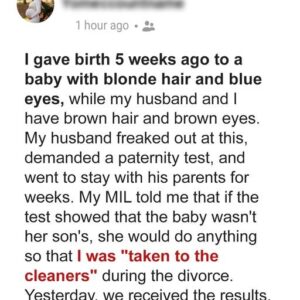When I met Will, I thought I was stepping into a fairytale. I was only 22, and he was 29, a widower with two children—Tamara and Nick. Our romance took off like a whirlwind, and within days of dating, he introduced me to his kids. I found it a bit strange to meet them so soon, but he insisted it was because he was certain I was “the one” for him and his family. Flattered and swept up in the excitement, I let myself believe in his dream.
We married a year later, and the wedding was magical, including heartfelt vows I exchanged not just with Will but also with Tamara and Nick. It was Will’s idea to make it a family commitment, and that day felt like the beginning of a perfect life together.
But not long after the wedding, reality started cracking through the fairytale veneer. Although I was working full-time, Will began leaving every aspect of childcare, cooking, and household management to me. When I brought up my exhaustion, he brushed it off, saying, “You’re so good with them, it just makes sense for you to handle it,” or, “I’m working hard to keep a roof over our heads, so I deserve to relax.”
What began as the occasional night out with friends soon turned into entire weekends of video games or social outings. And when he was home, he was either too busy to lend a hand or too tired. His dismissal stung, especially as I juggled my job with all the responsibilities at home.
His attitude trickled down to the kids, who started treating me more like a servant than a mother figure. They began echoing their father’s dismissive comments, questioning my authority, and rebuffing any discipline with complaints like, “Dad lets us do whatever we want.”
Within a year, I felt the weight of my decision. I knew deep down that our marriage was a mistake, but I felt bound to my promises to Tamara and Nick. I wanted so badly to be the mother figure they deserved, but Will’s indifference and the lack of respect in the house left me feeling trapped and deeply unappreciated.
As the years passed, the strain grew unbearable. I had to face the painful truth that I needed to leave to preserve my own well-being.
One day, with a heavy heart, I packed my things and left the house while they were away.
I couldn’t bear to say goodbye in person, so I left a letter, apologizing for not being able to keep the promises I’d made. I expressed my love for them but explained that I couldn’t stay in a situation where I felt so undervalued.
The divorce was ugly. Will transformed into someone I barely recognized—a bitter, angry stranger. I left with little more than the belongings I’d brought into the marriage, but the sense of freedom was an immense relief. Life after our marriage was much better for me, though I carried guilt over leaving Tamara and Nick.
I had promised to be there for them, and abandoning them felt like a betrayal of my own word.
Fast forward fifteen years. I was in my late thirties, and those turbulent years felt like a lifetime ago. Then, out of the blue, I received a call from Tamara, now a young adult. I braced myself, expecting anger or resentment. But her words shocked me and brought tears to my eyes.
Through her own tears, Tamara said, “Madison, you left the most beautiful memories in mine and Nick’s lives. You were the main mother figure we remember. We’ve always cherished the time we spent with you.”
Overwhelmed, I managed to ask how she and Nick had been. Tamara shared that as they grew older, they came to understand why I’d left. They’d seen how Will’s behavior drove others away and understood the strain I must have felt. Will had never remarried, though he had a string of brief relationships. It seemed he was still looking for someone to take on the dual roles of wife and parent, but no one stayed long.
We arranged to meet, and when I saw Tamara and Nick again, I was overcome with pride and joy. They thanked me, expressing how much my presence had meant to them. “You taught us what kindness really is,” Nick said, his voice filled with emotion. Seeing the compassionate, thoughtful adults they had become made me wonder if I’d done the right thing by leaving.
In that moment, I realized that perhaps, despite the sadness of leaving, the love and care I had given them left a mark that lasted. While I still sometimes questioned my choice, seeing the positive influence I’d had in their lives reminded me that I hadn’t left them empty-handed.
Sometimes, walking away is the only way to leave a meaningful legacy of love. Would you have done the same if you were in my shoes?





